It’s no secret that fuel prices are rising, and are projected to rise higher in the coming weeks. As we turn the corner from winter to spring, there’s a question looming over RVers, the RV industry, and related businesses such as campgrounds & RV parks: Will RVers be able to afford to drive their rigs this season?
Let’s take a look at the situation to help us all better understand what’s at stake, and exactly how much RVing we’re likely to be able to enjoy.
What’s Going On At the Fuel Pumps?
We drive a Class A diesel pusher, and as we write this post, the U.S. national average price for a gallon of diesel fuel is a record-breaking $4.88. Prices have risen more than 75 cents per gallon in a just week’s time.
In terms of a previous high for diesel, in July of 2008, we were paying at most $4.84 for diesel fuel, which would be just about $6.19 in today’s inflation-adjusted dollars.
As for gasoline, to provide some perspective, at the end of April 2020, the average price per gallon of regular unleaded gasoline was $1.77. As we write this post just under two years later, the average price per gallon of regular unleaded gasoline is $4.25.
Of course, a “national average” means that some areas are far more expensive than others. Many stations in and around Los Angeles, CA are charging between $6.69 and $6.99 per gallon… for regular gas! Even though cheaper gas can still be found in the area, it’s almost impossible to find anything below about $5.50/gallon right now.
As far as diesel in the Los Angeles area, you’d be hard-pressed to find anything below about $6.00/gallon right now. Some stations around the state are even charging well over $7/gallon!
And as long as crude oil prices climb, consumers can expect prices at the pumps to rise, too, with the national average for a gallon of regular unleaded gas projected to top $5.
All of this begs the question, how much can we all afford to drive? And one industry that’s likely to be hit particularly hard is the RV industry. For lots of reasons.
What Is the Impact of Gas Prices on RVers?
We all understand that, in general, the more of a fuel-guzzler we drive, the more it’s going to cost us to get from point A to point B. It’s no secret that RVs cost more money to drive than your average automobile, due to size, weight, and a few other factors.
Let’s take a look at the various classes of RVs and how the owners of each class might feel the pinch this season.
Class A RV
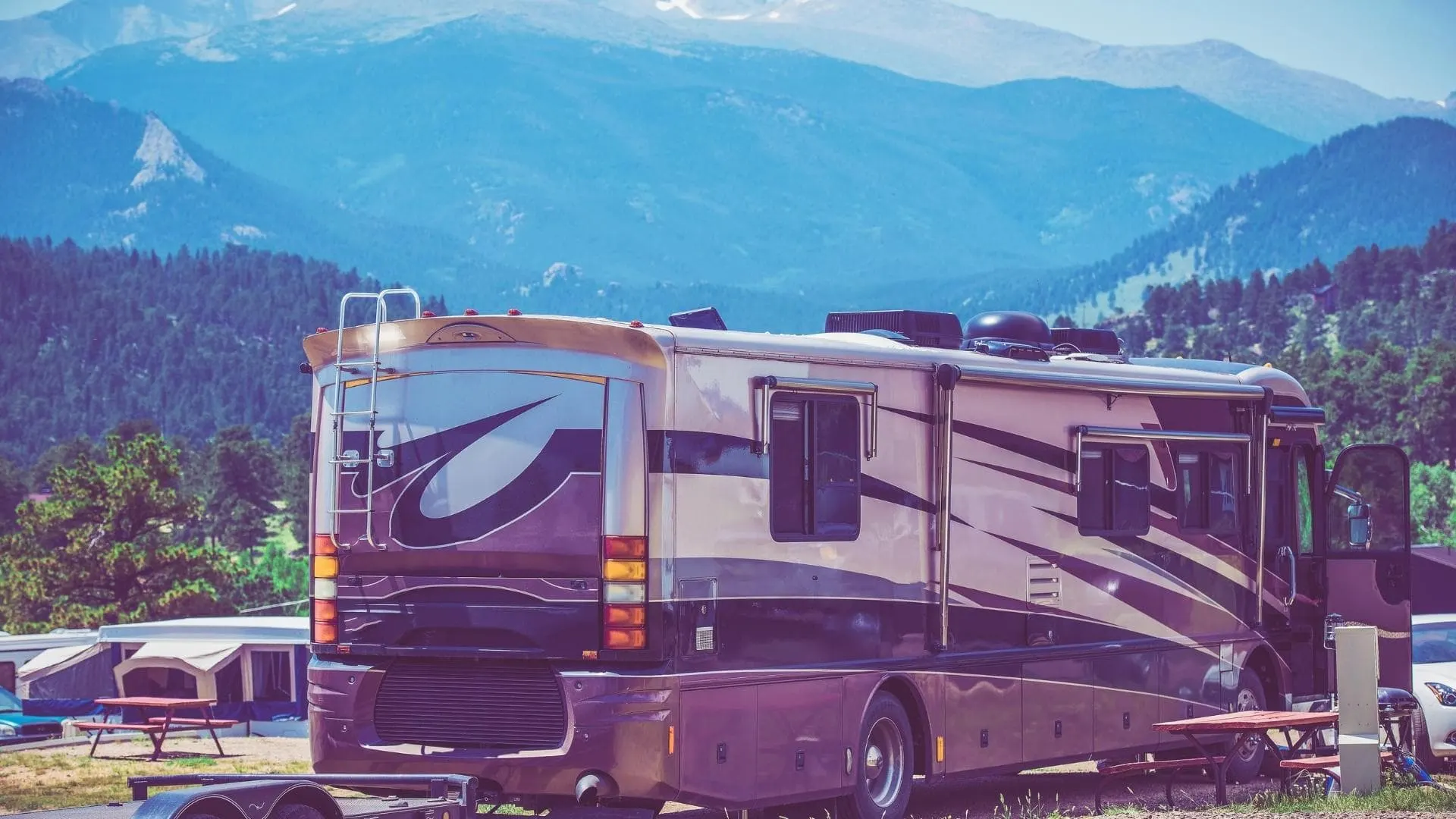
Owners of Class A RVs are going to feel the pinch at the fuel pumps this summer, but there are ways to compensate for that pinch!
We’ve got considerable experience with this class since we’ve lived in a Class A RV for nearly two decades now. As we noted in our post on the typical fuel economy of a Class A motorhome, depending on size, weight, and several other variables (wind, hills, poor weather, weight of your towed vehicle, etc.), large gasoline-powered Class A motorhomes typically get somewhere between 6-10 miles per gallon in ideal conditions.
Diesel pushers like ours do a little better, with a typical average of 7-12 mpg, again mostly depending on size and weight (including the weight of everything you store onboard).
Class B RV
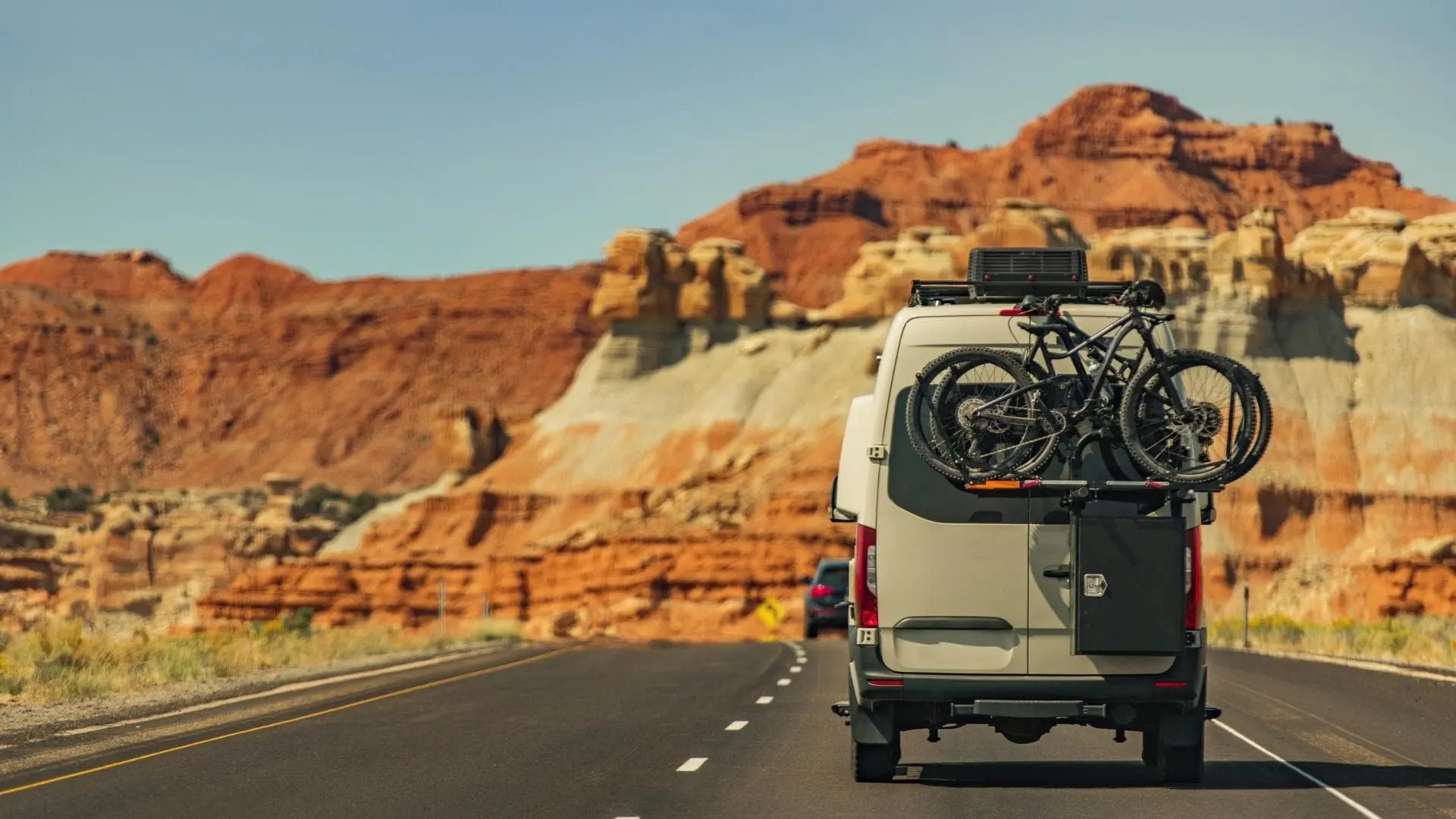
Many Class B RVers will be happy to be living small this summer with fuel prices up.
Class B RVs vary in size and type as well and tend to typically get anywhere between 10 and 25 miles per gallon, (with 25 being on the rare high side).
Bear in mind that some Class B rigs can get as little as 6-7 mpg. As with the Class A (and every class of RV), towing a vehicle or a trailer behind the rig will also have an impact on fuel mileage.
Class C
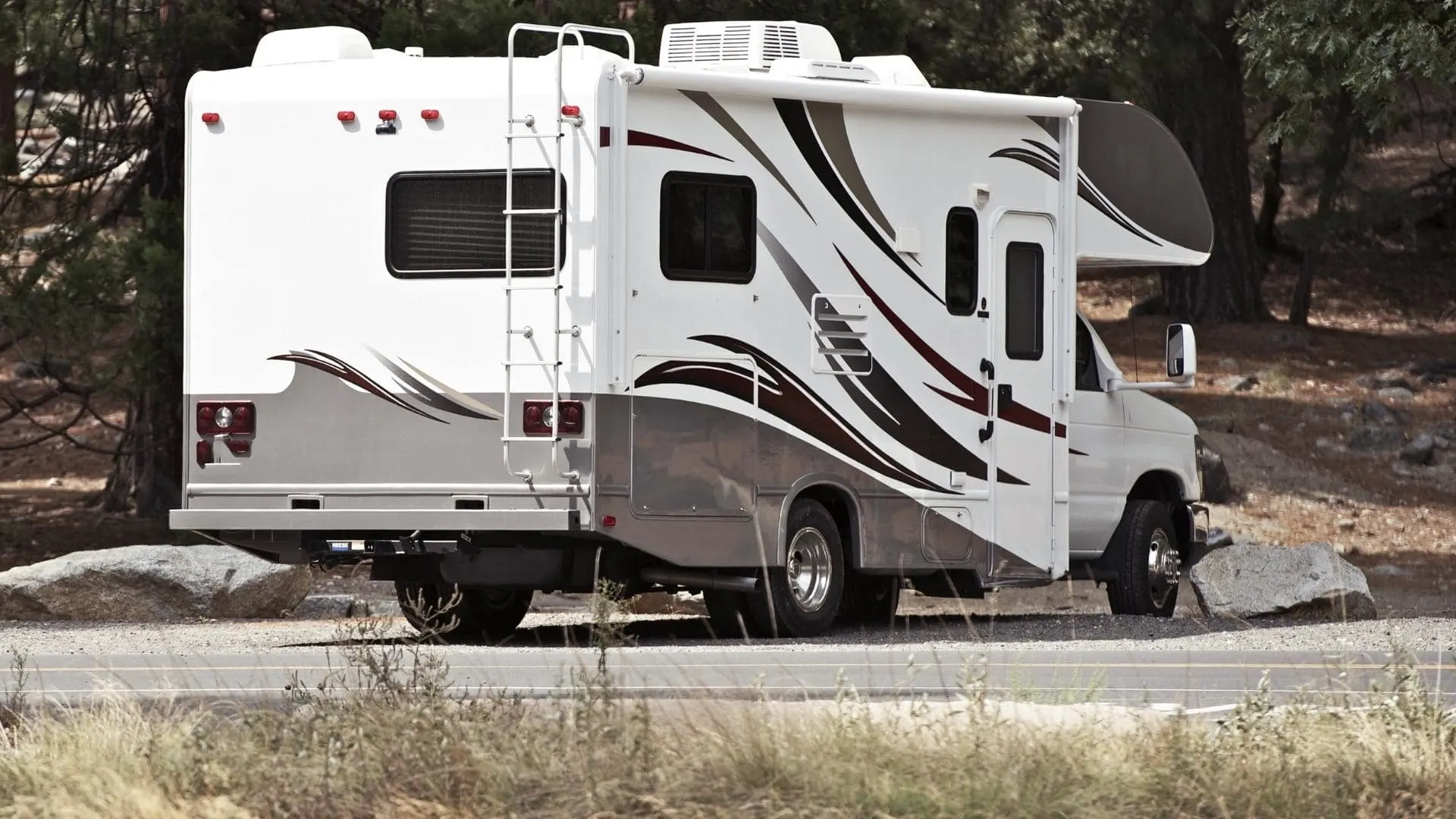
Class C RVs vary dramatically in size and weight within the class. Obviously, the smaller and lighter the RV, the less high prices at the pumps will hurt.
A Class C RV sits squarely between A & B in terms of RV classes (which seems like nobody was looking at the alphabet when they named them). But the term “Class C RV” typically refers to a rig that’s anywhere from about 21 to 41 feet long. That length, and the corresponding weight of the rig, will obviously have an impact. With that said, the average fuel mileage of a gas Class C RV is typically somewhere around 8 to 10 mpg.
Travel Trailers (Including 5th Wheels & Toy Haulers)
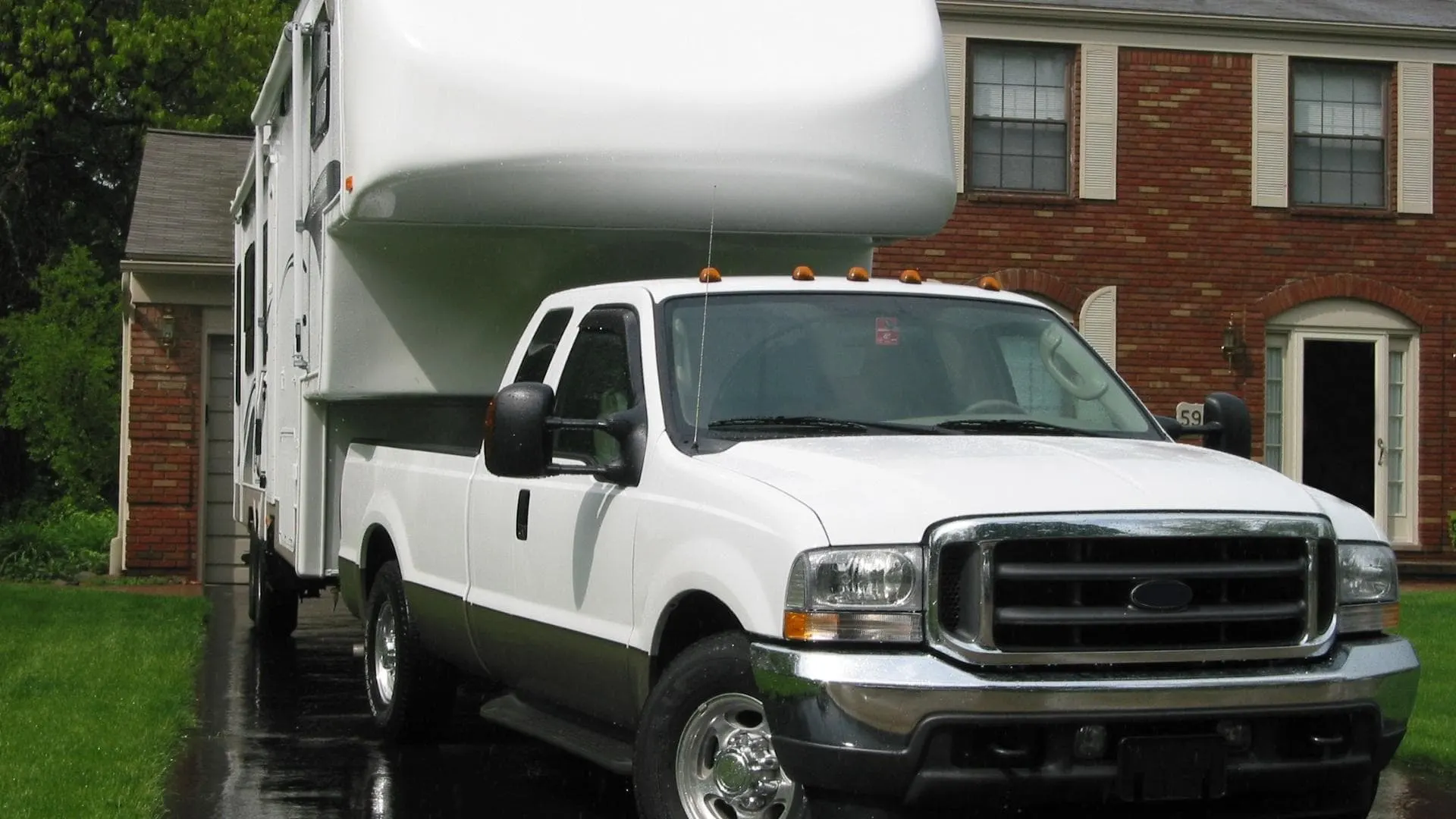
Travel trailers of all types also vary widely in weight and length. RVers who tow smaller, lighter weight travel trailers won’t feel the pinch the driver of this F-350 hauling a 5th wheel will feel.
Travel trailers vary substantially in size, weight, and aerodynamics, so it’s difficult to offer a real average in terms of how these rigs impact fuel mileage. In addition, the tow vehicle being used factors in as well.
With all of that in mind, it’s said that towing a mid-size travel trailer can decrease the mpg of a truck by around 7 miles per gallon. So, a truck that typically gets 15 mpg, would more likely get somewhere around 8 mpg while towing a travel trailer. Again, this depends on the tow vehicle as well as the camper being towed. So, your mileage may vary, literally and figuratively.
How Will Fuel Prices Impact RV Travel This Season?
According to the RVIA (RV Industry Association), the average RVer travels around 4,500 miles in a year. The RVIA also projects that an RVer could spend 30% more on gas this year compared to 2021.
But if history is any indication, RVers aren’t likely to park their rigs and stay home. They may cut their fuel costs a bit by traveling shorter distances on average than they typically would, but RVers love to hit the road and camp. That is after all, why most of us bought our rigs in the first place. Most want to continue to vacation, enjoying nature and all the recreational activities available to us.
Some RVers who, in past years, may have driven across numerous state lines during summer vacation, might this year be more likely to limit their travels to their home state or nearby states. They may spend more nights in one place and fewer days on the road, or they may travel for two weeks instead of three. But RV owners are still likely to hit the road.
What Can RVers Do to Make Up for Higher Prices at the Pumps?
In addition to cutting back on how far (or how frequently) they travel, RVers can use several other options to try and help offset the high price of fuel this year. These include, but aren’t limited to, the following:
Boondocking
One way to save a substantial amount of money, that you can then use to put fuel in your tank, is to do more boondocking! We highly encourage boondocking because it’s our favorite way to camp, and we want other travelers to find the same joy in the boonies that we do.
If you’ve never done any boondocking and you find the idea intimidating, you can start by checking out our YouTube video for a guide to “cutting the cord” and getting started as a boondocker. You’ll be a pro in no time!
We’ve also got a post with 27 fantastic boondocking tips, and another with the 11 best ways to find RV boondocking spots!
There are also lots of free apps available to help you to find great boondocking spots, and you can check those out in our post on the 7 best free camping apps for the avid boondocker.
What? You haven’t equipped your rig with a roof-full of solar and a massive lithium battery bank yet? No problem! How about considering a portable power system?
If one of the above options doesn’t fit the bill for you, there are lots more choices available, too!
Free Overnight Parking
If you’re traveling to a particular destination and would like to stop for the night to have dinner, relax, and catch some zzzz’s before moving on the following morning, you may want to have our post on free overnight RV parking handy.
And if you’re wondering if you can camp in Walmart parking lots, we’ve got you covered there!
Get The Best Gas Price You Can
Regardless of what the prices are at the pump, knowing how to find the best price for fuel in any area you’re in can make a big difference. Especially if your tow vehicle or RV has a large fuel tank (ours is 150 gallons). Saving even just a few cents per gallon can add up when you’re putting 100 gallons into the tank!
Luckily, there are apps for that! Check out our post on the 5 Best Apps to Find Cheap Gas for Your RV & Car so you can make sure you get the cheapest price you can (even if the price itself isn’t actually cheap).
Save Money on Campgrounds
There are also lots of ways to save money on campgrounds, including some fantastic and unique opportunities that can be found by using The Dyrt App.
And finally, as you’re planning your RV travels this coming season, be sure to check out our 5 best RV trip planner apps!
Will High Prices at the Pump Affect Your RV Travel Plans This Year?
Even with the many ways for RVers to save money to make up for the temporary rise in fuel prices, we know that the price at the pump is still going to give people pause. Are you planning to let it affect your RV trip planning this year? Or are you going to ignore it and get out there and enjoy? Leave us a comment and let us know how fuel prices are affecting your travel plans this year!
Geek Out with Us Every Week
Join our newsletter to learn about all things RV-related. Every week we offer free tips, tricks, product reviews, and more to our online community of RVers. So, whether this is your first time on the road or you’re a seasoned expert, we’d love for you to geek out with us!





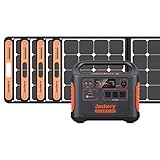
Gay Travel Enthusiast
Sunday 12th of March 2023
Given the insane prices of gas, and even more so diesel prices, why do people keep buying larger and heavier RVs? If I had the money and someone to share the experience and responsibilities, I'd buy a smaller RV, one that's between 20ft in length and 30ft. They use less fuel and depending how they're built, you can still move around in the motorhome comfortably and travel comfortably. You'd think there'd be smaller RVs out there for those who like to travel, but don't need a massive school bus to travel the country in. Even full-timers don't need that much vehicle, or do they?
TheRVgeeks
Sunday 19th of March 2023
Sitting here in our 43 foot, four slide, diesel-powered beast of an RV... we're gonna keep quiet on this one, Jason! ???? LOL!
Pat Meshenky
Sunday 22nd of May 2022
Gentlemen having followed your post's for many years I agreed with the majority of them. Your latest about saving money on fuel coast is not the best money saving way. Sure the fill up cost may seem the way to go BUT the MPG will always suffer because of the blend of ingredients and octane rating. Cut-rate gas stations profit on re-fills sooner because you don't get higher miles per gallon. We learned this the hard way by filling up more often than using a premium brand name such as EX____ and SHE__. We are having a custom home built 500 miles away and check on its build frequently. On cheap gas $.15 a gallon less, we use on average 1 and 1/4 tank fills. Using quality brand we complete the same on 3/4 to 7/8 at highway speed average of 70mph (inter state). We have tied various ways to improve mpg by blending cheap and expensive but best is the last 7 trips with better grade. It is well worth the slightly higher cost for improved mpg. Will check our 07 Mountain air diesel pusher @ $5.85 - 6.00 + when home is completed and we move into it.
TheRVgeeks
Sunday 22nd of May 2022
Thanks for sharing all that data, Pat.
Steve
Thursday 17th of March 2022
Gentlemen, I like you articles very much and find them very informative.I would like to share them to an RV group on Facebook the group is "Full-Time Rvers" but I can't seem to do that! Heaven forbid I break some Facebook posting laws! Any ideas?
TheRVgeeks
Thursday 17th of March 2022
Hey Steve. Thanks for the kind words... and for wanting to share our articles with others. We're going to apologize here... we're not on Facebook, so have virtually ZERO knowledge about it's inner workings. So we're not sure what's happening with not allowing posting to a Facebook group. We'd assume that if you copy the URL of a post from your browser and pasted it into a post on FB, it should work just fine. Is that what you're doing? And, if so... what happens? Maybe we can Google to find out what could cause your problem... and see if there's something on our end that's preventing it from working for you.
Chris
Wednesday 16th of March 2022
So thankful I did not buy that overpriced C class RV. That did not even have a dedicated bed. And even had to pull up a table and find a place to store it. I can hear that big V8 gulping down the gas as my wallet gets lighter mile after mile. Having to spend $225.00 each fill up!
TheRVgeeks
Wednesday 16th of March 2022
Sounds like a good choice, Chris. This is going to be another challenging year.
Assistant Prepper
Tuesday 15th of March 2022
Shorter trips, less frequent trips, cooking in the camper, and thank God we didn't buy that motor home that was such a bargain.
TheRVgeeks
Wednesday 16th of March 2022
Yup. Another challenging year ahead apparently.